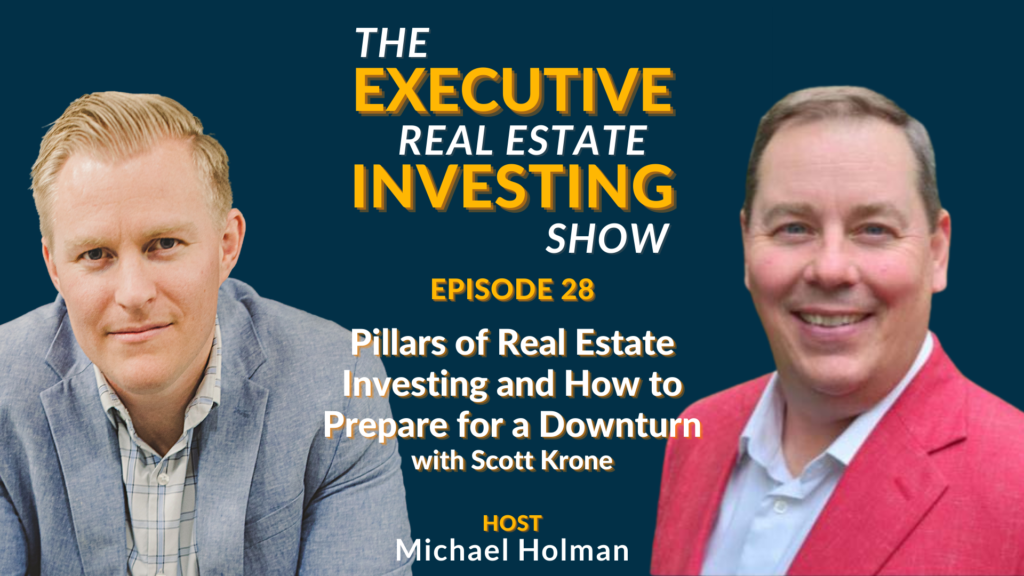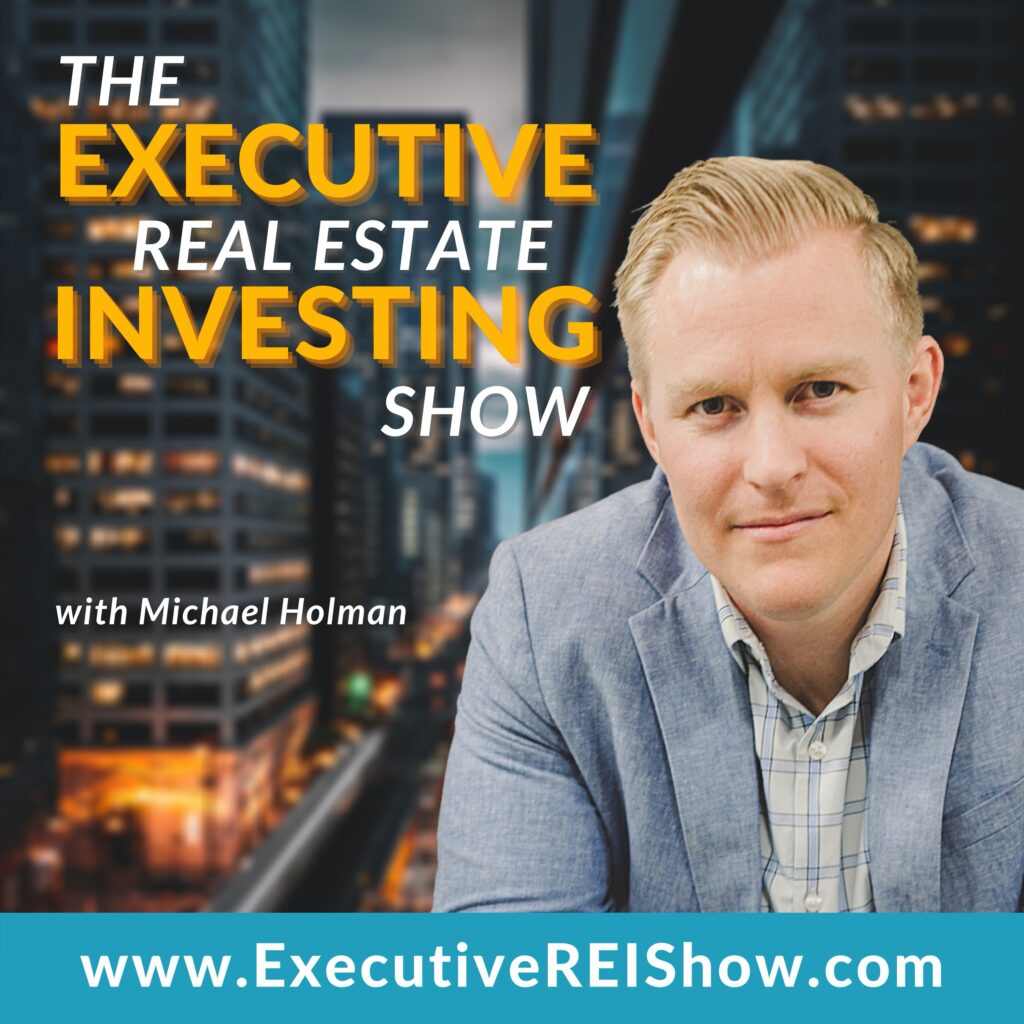
The executive Real estate investing Show
EPISODE 28
Pillars of Real Estate Investing and How to Prepare for a Downturn with Scott Krone
- December 13, 2021
EPISODE SUMMARY
When Opportunity Knocks, Answer! How An Architect Designed His Own Future In Self-Storage. This week on The Executive Real Estate Investing Show, host Michael Holman talks with Scott Krone.
Scott Krone had dreams of being an architect, but when a professor gave him a chance to lay down his drafting pencil and pick up a contract-signing pen, he took it. Learning real-estate development wasn’t easy, but Scott’s mind for design and analysis set him on a path to success. Today, Scott has transitioned out of multi-family investments and concentrates solely on self-storage. His companies Coda Design + Build take self-storage from concept to construction, where it’s handed off to his Coda Management Group. Currently his companies have investments in excess of $55mm. Not comfortable sitting on his laurels, Scott is also a real estate coach, and the author of “High Performance Homes Navigating the Green Road to Your Dream Home,” a book for home owners seeking to incorporate green technology into their home.
Listen now to hear Scott tell his remarkable story of risk-taking, and how it can pay off.
EXECUTIVE TIP
Take The Opportunity When It Presents Itself
LISTEN TO THE PODCAST HERE

The Executive Real Estate Investing Show Podcast
EP 28: Pillars of Real Estate Investing and How to Prepare for a Downturn with Scott Krone
Listen on
READ THE TRANSCRIPT HERE
Note: Audio transcription has been automatically transcribed
Welcome to The Executive Real Estate Investing Show. This podcast is for you, the busy business owner or executive looking to create generational wealth. Here, we’re going to show you how to do that through real estate investing from multifamily to industrial and everything in between. You will become a real estate investing expert. And now, here’s your host, Michael Holman.
Michael Holman: Hi everyone, and welcome to another episode. Can you executive real estate investing show as always. Michael Holman. And we have a great guest with us today. Excited to get things started. His name’s Scott Krone. He’s done a lot of stuff and you know what? He started in architecture.
He moved into development and investing a fantastic personality. And one of the things that you’re going to see that I absolutely love about this interview. He pulls his head oftentimes out of the real estate sand. Right. I love hearing that because you get all of these people, all these real estate investors, and sponsors, you started in 2015, 2016, right.
And up till now. And it’s like, wow, life is great. Right? Like things couldn’t be better. Things are moving forward. And it’s really important. I say, oftentimes, people like you have to understand. Recession and you have to understand what it’s like going through a downturn, right? Because whether it’s two years, 10 years, 20 years a recession, a downturn is going to happen.
And if you don’t think that the economics of the entire country, nation, everything that’s going on is going to affect real estate. Think again, it happens all the time. And so he, he specifically talks about these pillars, right of real estate investing and, and what you need to be watching for. And I am going to tell you, go listen to that part and go gain an understanding because it’s fantastic.
Okay. If you haven’t checked out our website yet, go check it out right now. www.ExecutiveREIshow.com. We got shows, we got resources, we got all sorts of stuff up there. Go check it out. Also, if you’ve been listening and you haven’t had a chance to leave us a review. Go to apple podcasts, go to Spotify, leave us a review, leave us a rating.
We’d love to hear from you. That is a great way for you to share show your love of the show. We really, really do appreciate that. We recognize it each and every single review that we get. So please go do that. And we thank you in advance for that. Lastly, before we get into the show, we got to start with today’s tip and today’s executive tip take your opportunities when they present themselves. That’s one of the things you’re going to find with Scott that he does often, right? Throughout his entire career, it was kind of these, these different opportunities, these different windows, and you know what, it’s amazing what happens when an opportunity opens up and there’s all you do is just walk through.
Right. That’s like all you have to do to get started, just walk through the door of opportunity and see what happens next. Right. And what ends up happening is usually backdoor leads to more doors, which leads to that door. You know, even if one of the doors burned down, you turn around and there’s a different door standing there, go through those doors of opportunity, take those opportunities when they present themselves, because that is going to lead you past this, this state of fear to a level of success that I don’t think most people will ever achieve in life. So be one of the few that walk through those doors of opportunity. Get outside your comfort zone. Now let’s get into the show. Today’s show with Scott Krone.
Hello everyone and welcome to another episode of The Executive Real Estate Investing Show. So excited today, I have Scott Krone with me. He is the founder of what seems like a hundred companies. We were just talking about it. He’s founded well, let’s see Coda Management Group coded design build. He’s founded the One-Stop Self-Storage. He’s the author of High Performance Homes. I mean, the list just kind of goes on and on Scott.
But welcome to the show. Thanks for joining us today.
Scott Krone: Thanks for having me. I appreciate it. Maybe I had to do it so many times in order to get it right.
Michael Holman: I love it. I love it. When. Tell us a little bit about yourself.
Scott Krone: Well, I I’m, I’m resided here in the state of Chicago, just north of it. And we developed our company.
I began in 1998 and since then it’s grown. We really began focusing on self-storage. We sold off our multifocal. But we’ve been able to expand our self-storage from Wisconsin all the way to Maine and down through Virginia and all the states in between there. So we’re, we’re excited about our growth that we’re been doing and where we continue to go.
Michael Holman: Fantastic. I love it. Well, I’d love to kind of hear just a little bit more about your companies as we get going here. So you have Coda Management is that, is that managing self-storage or what is, what is Coda Management specifically managing.
Scott Krone: It’s managing ourselves. Our real estate investment portfolio, which is currently self-storage, or may begin in a different divisions of real commercial real estate.
So we had apartments, we have flex warehouse space, all those sorts of things, but we’ve liquidated a lot of that and focus our attention specifically on self-storage. So that oversees all of our cells store.
Michael Holman: You, you read my mind. That was the next place I was going. So tell me about coated design
Scott Krone: code, a design build facilitates our development side of things.
So when we develop something, when we design it, we build it, we’ll facilitate it through that company. So each of our individual companies will hire coated design and built to do all the work in one stop, self-storage. When we finish our development, we turn it over to one, stop, self-storage, and they manage our client interface.
So our customers come in and they’ll rent through one stop self.
Michael Holman: That is fantastic. I you know, and I love that we’re talking about self-storage, cause it’s, it is one of my preferred, one of my favorite asset classes. We’re doing a lot of it out in the, in the west and Utah and Arizona. I’m. I’m interested to hear, why did you pick self-storage?
Why, you know, you said you kind of liquidated everything and honed in on self-storage. Why self about yourself.
Scott Krone: Well, as I mentioned before, I began in multifamily and that was my background. And when we began something, it was really you know, the field of dreams approach, build it and see if they will come right with self-storage.
It’s a lot more predictable. It’s a lot more consumer driven and we can model that. And so it’s a lot more predict. But we also went back and studied the last four major significant recessions in the U S economy. And our studies indicated that self-storage actually thrived during those recessionary markets.
So I haven’t seen any other division or product within commercial real estate, which has done as well as self-storage during that those periods of time
Michael Holman: And you know what. Honestly, I think you and I are going a lot on the same page because we felt the same way about self-storage and one of the, one of the reasons we have such an affinity towards it.
So I love that you kind of did your research and honed in on that. Now I want to kind of take a step back go back a little bit to the beginning. How did you get started in real estate?
Scott Krone: Well, I was fortunate iteration family business in the die-casting world. And I plan on going into that and being the only male around the business and my brother, but my sister wanted to be a teacher and my younger cousins that were girls.
They didn’t really express any interest in die-casting the can’t imagine why. And my parents showed up for parent’s weekend in college. And they said, what are you planning on doing next year? And I said, you know, I thought I’m going into the family business. They said, no, you’re not. And I was like, what did I do to piss off grandpa?
And so, you know, that was, that was a major fork in the road for us and our family and you know, my dad, I, I pursued architecture in high school. Might dad said, well, why don’t you consider architecture again? And, you know, I thought I closed off that, you know, I looked at technical schools for college and then I looked at liberal arts, but I ultimately chose a liberal arts just because of two reasons.
One, I wanted to play sport. In college and two, I wasn’t a hundred percent convinced of it. And if I was at a technical school and I didn’t like it, then I felt that would be trapped. And so I went to liberal arts direction and I found out that they actually had master’s programs, which allowed non architectural based students to get a master’s degree.
And so it was a three and a half year programs. That’s how I got into real estate.
Michael Holman: Awesome. So you started an architecture? I, as I imagined. Obviously led the pathway to Coda design build. When did you, are you still active in architecture? Did you make kind of a, it sounds like you might’ve made a transition into more the investing side of real estate versus designing the real estate.
Talk to me about that transition for you.
Scott Krone: Well, my, my really my first professor was was an architect who owned a real estate development company and contracting company that focused on multi-family. And so, you know, I was his TA, so that meant I had to, in his mind, I had to work for him for free.
And I quantify, I said, well, there’s 20 hours that I’m supposed to work for you for my degree. So from seven in the morning, till noon, I would work for him in his office. And then from like one to six, I’d worked for him in class. And then from seven until midnight, I would do homework for him from seven to midnight.
I was working for this guy for almost three years, but because of that, because I was undergraduate and liberal. I was predominantly the only one in the office who were the students that could, I was the only one who could read a lot and, and process things. Everybody else loved to draw, but so he put me on the development side of things and that’s where I really learned the development side of the business.
And so I would say that during my six years at that point, I probably did like 95% development and about 5% of the architecture while a lot of my other classmates were a hundred percent architecture. And so it allowed me to learn both sides of it. So we still facilitate the design, but you know, in our projects, again, the design is less than 5% of the total project.
So I’ll complete a design within a week and then we’ll spend the next three years.
Michael Holman: Awesome. Awesome. Well, that’s really interesting. I love how you kind of took these situations in life. Right? You kind of mentioned it earlier, these forks in the road, right. That you had to kind of pick a path and it’s, and it’s really interesting as I, as we’re talking, you can see specifically in your life there’s these multiple times where you had to make a decision on which direction to go, right.
You know, the die-casting and then you had to switch from that. Well, I had to go to architecture. Well, then when you started in architecture, right, you probably could have pushed back on the developments said, no, I don’t really want to be in development. I want to be more architecture, but you, you found an opportunity.
It sounds like you took it. Which, which continued to lead you down. Past, and I love how life works like that. I mean, it seems like when you’re, when you’re taking the opportunities that are presented in front of you, that’s when more doors open. And so I love that you found that and it’s like progression through your life.
I feel like that’s what happens a lot in business and real estate investing.
Scott Krone: Absolutely. It’s just not the good forks, but it’s also the bad forks, the challenges, right. I was just talking with someone yesterday or on Friday. About, you know, a challenge that they were going through. And I said, Hey, and the response was why I’m going to quit.
And that’s a fork, right? And I said, well, you can use it as a reason to move away from it. Or you can use it as a learning experience and lean into it. You know, your choice, it’s your decision. But ultimately it’s another fork in the road. And I think that a lot of people don’t really see the negative challenges, but I think negative challenges.
As much of an impact as the positive ones. So I think we there’s lots of forks, so we can constantly.
Michael Holman: Oh, I love it. I love it. And I can definitely attest to that. I mean, I one of the things that kind of came to my mind, just as a silly example, I remember we were we were buying some land for a small office development.
Back when I first started at Overland group and there was a, it was a $5,000 earnest money deposit. Wouldn’t that be nice nowadays, but it was a $5,000 earnest money deposit and There was an option to an extent. And I called the agent and I said, yep, I want to extend, we’re going to do it. Plan on it.
It was over the Christmas break that I had to give that notification. Well, I had failed to notify in writing. I only had noticed that. Verbally. And so needless to say, they ended up selling to somebody else. They, you know, they had somebody else in the wings is going to pay more. They were just waiting and hoping that we didn’t come through.
And we lost that $5,000 earnest money deposit. Well, I can assure you. Then I have never lost another earnest money deposit again, over something like that. So completely agree. Right? Those negative, those hard things that we have to go through, those can shape us, you know, make us understand. Cause it’s, it’s what we want, but it’s also what we don’t want, what we want to avoid.
That really shapes the decisions that. So that was, that was fantastic. Awesome. I love it. Well, so you were working for this professor. I started in his company. It sounds like that TA position turned into a full-time job. When did you decide to go off on your own?
Scott Krone: You know, my, my annual review was up and you know, he said, well, you should expect big things. You’ve been doing a great job. We’re going to do this, this and this. And then negotiations, when it came time to, you know, my review and the, in my compensation didn’t go so well, as well as I’d hoped. And so I began interviewing with other people.
And one of them was the former CEO as the CFO of the company who went and started his own. And so I, I made the transition moved over there and I was brought into assessing an entire project to run the entire 90 townhome development. And within the first month I determined that this $3 million in profit project was actually going to lose half a million dollars.
And you can only imagine the pressure that I put on. The partnership and the, and the three people that were the owners of the company. And needless to say, you know, for the only employee in the company, you know, it, wasn’t a very stable position. And so, you know, I could have made two choices, one turn my tail and try to go back to my original company or, you know, I, again, I saw as an opportunity, I said to them, Hey, look, you can’t afford me full-time but you can’t afford me to leave because I’m the only one who, who understands.
The whole project now. So what if I worked for you for our time and him allow me to start my own thing part-time and so that’s what I did. And so, you know, the, the very ripe old age of 28, I went out and started my own company and we bought a property. We tore down a house and we bought a new one and we sold it.
And then shortly thereafter I departed the other company and just one full-time.
Michael Holman: I love it. Well, 28, right? You garnered some experience that must’ve been a little bit of a leap for you, you know, talk to me about you. What ultimately what led you to make that decision and maybe what were some of the biggest hurdles and challenges?
I know a lot of people that deal with this and a lot of people, a lot of our listeners in fact have, have had to overcome this themselves. So talk to us about, you know, what was that transition like? You know, what, when did you decide to do it? And what were some of those early hurdles that you had to overcome?
Scott Krone: Well, when I’ve, when I first decided to do it, when I, when I saw how much money was being made in, in that field and how I was making that money for other people. And I was like, why can’t I do this on my own? Well, you know, what is prohibiting me from starting this when I’ve seen other people do it? And that’s probably the arrogance in being 20 years old.
So I’d say the biggest hurdle was, you know, I still get carded today. And I, you know, I, I just, you know, conveniently point out the bald spot on the top of the head and like early, but you know, back then, if I was 28, I probably looked like I was 18. You know, credibility was a huge one, you know? And then I think it’s the same thing for anybody who starts off their businesses.
You know, what credibility do you have in the marketplace? You know, how do you prove yourself if you haven’t done it before? And when I was coaching real estate, I always emphasize that people don’t rely upon their. Enough when they’re starting something new, but the past forms us the past determines where we’ve been and how we’ve gotten there.
And it provides us with a lot of experience. And I don’t think a lot of people were. Appreciate that when they’re, when they’re evaluating themselves and how they present themselves to other people. And so, you know, when I’d have to go before banks, you know, granted I did have other people help guarantee loans and those sorts of things in order to get it done.
But I would relied heavily the fact that I was, you know, a project manager for a $24 million project, and I was running a $57 million project and doing all these other things to show my experience that I had garnered over the past, you know, six, seven years. And so. You know, that was the foundation of how I began.
And it certainly wasn’t easy. I mean, it was very difficult convincing, you know, banks and investors that, you know, 28, 30 years old, 30 years old that you know what you’re doing. And, you know, fortunately the market was strong enough that you know, we were able to do well performed and, and advanced returns back to our investors.
Michael Holman: Awesome. Well, you kind of mentioned that the real estate market I’d love to kind of get your thoughts, right? I mean, you started, you said you started at 28, you have these great businesses. You’ve done a lot of things developed and invested in a lot of things. I mean, really over the past 30 years of that, of your real estate career, we know what trends have you, have you seen in the real estate?
Scott Krone: Well, when I first came in and we had massive inflation that, you know, that was the early nineties and, you know, the lenders were talking to us about buying points so that we could sell condominiums to, in order to give our buyers a more competitive mortgage. So we I’ve, I’ve seen that I’ve seen, you know, shortages and drywall, masonry steel you know, fuel, you know, those were the big ones and we had the internet boom bust, and then we had the real estate market bust.
And then you know, the pandemic recently. Those are the four main, I mean, granted, the pandemics not really considered recession based upon how the government’s been propping up the economy, but you know, the downturn was very sizable, noticeable, you know, obviously in the first quarter and beginning of the second quarter of 2020, but those are the four major recessionary markets that I was talking about.
And the biggest takeaway. And taken from those is that I need to be paying attention to the overall market. You know, I can’t get too far out over my skis being, you know, from Utah. You’d appreciate that analogy, but you know, it’s, it’s important to always have your pulse on the marketplace and you know, I’ve been fortunate enough to, to be aware of that and begin pulling back.
You know, when the housing market crash. We were only sitting on two properties at that point in time. And a lot of my competitors were sitting on 20 and I stopped buying because I saw too much pressure on that. And you know, I didn’t, I didn’t predict that the housing crisis was going to occur. I, you know, I thought there was going to be a downturn.
But the same sort of thing is with. Currently within the pandemic and what’s going on. I, I began pulling back in multi-family four years ago and most people might say, well, I pulled back too early. That’s fine. I’d rather be too early than too late because the backside is usually the lot steeper than the front side.
And so right now, I’m probably preparing for another recessionary market. You know, we’re, we’re thinking that we’re going into recession and especially some of the things that are being implemented from DC. And if those things continue, I think it’s going to be a tough couple of.
Michael Holman: Yeah. Well, so with that in mind, right?
You kind of mentioned, I think we might be heading into our session having been through these other recessions, these other downturns what’s the, the number one advice that you would give real estate investors right now in order to prepare yourself for a potential recession in the future.
Scott Krone: One, you got to really make sure that you’re not spending too much on any one thing, you know, be it land or any other item in there because costs are going to be really dictating your overall loan structure, which impacts your interest and how well you’re able to weather the storm. You know what competitive advantage you have.
As I said, not getting too far out over your skis. So making sure that you have proper leverage, making sure that you’re going into solid markets, that you’re not assuming that a market is stronger than it really is. And I’ve seen a lot of people do that in terms of where we live in the speculative housing market.
Everyone’s like, oh, this will never impact here. To put it in perspective housing prices are exactly the same as they were 10 years ago. Now, you know, that’s not the same for everywhere in the country, but here in this market in Chicago, The literally homes that were on the market 10 years ago are, are retraining at exactly the same price.
So if we had, based upon that on speculation, there’d be a lot of hurt. And that’s one of the reasons why we moved out of the speculative housing market here in the.
Michael Holman: Yeah, that’s really interesting. And there’s a couple of things that I really want to dissect from everything that you said. Right. And so I love this idea right in this notion, don’t get over your (inaudible). Don’t you know, don’t get too over leverage. I’d love to dissect just a few details of that. So for you in your investments, what are you seeing as, and what do you anticipate is kind of the right amount of leverage? On a real estate investment nowadays. Let’s, let’s say it’s a self-storage, something run of the mill for you.
What, what kind of leverage are you putting on that?
Scott Krone: Well, we’re putting around 70, 70% debt to it. But we’re also looking at what the debt structure is. And so anyhow, any opportunity that we have to put longer term debt on it with a secured interest rate, that’s what we’re looking to do. So to make sure that we have long-term interest rates that, you know, inflation is, is creeping into it.
You know, people say, how do you mean. I go to the gas station. I go to the grocery store. Everything is costing us more construction spots in this market, but you know, there’s no doubt in my mind that inflation is going to be impacting us. It’s just a matter of how much the fed can keep the throttle on the keeping the interest rates low in order to propel the economy.
And that’s, that’s the challenge that they’re going to be facing right now is with these rising costs, they’re going to have to be pushing prime up and that’s going to slow down the economy, which is one of the main reasons why I think we’re heading towards a recession, right?
Michael Holman: Yeah, no, I, and something that that’s really interesting.
I love cause that’s something, that’s a question. Honestly, I get asked all the time. You’d be surprised how many times I get asked that. New investors or people who are interested in, well, what’s the right amount of debt. What’s the right amount of leverage. And I think you hit it right on the head. I mean, what I love that you say leverage is definitely a tool to be used in real estate.
And for me, I tell people, look, there’s, yeah, there’s a certain amount of leverage. It’s too much leverage. But if you are smart about it, like what. Look, we’re trying to get locked into long-term rates right now. And, and long-term loans where rates don’t change. If you’re getting into long-term fixed rate loans right now I would argue to say that that putting debt on your property instead of going all equity and I have a whole segment about this actually reduces your risk in the long-term.
And I won’t get into that right now, but I think that what you’re saying is honestly, spot. Right. If you’re looking at, if you’re looking at getting a deal done, I think putting leverage on it is a fantastic idea, but putting the right kind of leverage is crucial to the success of that project.
And you personally, I love how you mentioned that one of the things I want to kind of get into. Right. You’re talking about the economy and I love it. When real estate investors pull their head out of the real estate, investing sand and take a look around and see what else is going on.
Right. And so we’re talking about the fed. We’re talking about inflation. Where do you see that going in the, in the near future? And how do you think that that impacts real estate investors?
Scott Krone: Well, I think real estate investors. Well, just got around a major threat out there with the IRAs. If IRAs were going to be wiped out for investing in real estate, that was just going to be a huge hit.
I mean, I can’t tell you how many billions of dollars are probably invested in IRA money in real estate. So that was a big one to avoid you know, 10 30 ones, capital gains taxes all these mechanisms, which people are investing to realize, you know, tax shelters is a, is a big, still big factor. That’s still on the, on the market, on the, on the question in terms of what’s going to be happening at the federal government level.
And if those things happen, I mean, We’ve already lost jobs to oil. We’re seeing supply chain issues of that raising prices. We’re seeing labor shortages, which are increasing costs. And then if we’re then impacting capital gains, those are like the four main. Segments or legs of the real estate economy.
Plus the fact that the only remaining one is interest rates. So if inflation is rising, then that’s going to be putting more up tech pressure on interest rates. I mean, those are the five pillars of real estate. So if, if we don’t have any of those mechanisms to avoid, you know, acknowledge our risk, the risks that we’re putting in at least getting compensated for that risk with our tax rates.
That’s not the window. If labor costs and supply chain costs are higher and then interest rates are higher, those are all mechanisms for, in my mind, which are going to be impacting a recessionary market within real estate. Now the good news is for me as a real estate investor, is that. That is the time when most municipalities are easier getting projects rezoned.
It is also the time when, if there’s money on the table, that we can get better pricing for construction. So that’s, that’s the plus side, but in, you know, getting to that point causes a lot of pain. So I think that that’s where we’re going to be. Is that, that pressure point of pain.
Michael Holman: You’re speaking my language, Scott.
I literally, I spend so much time rezoning properties, getting capital, getting favorable construction loans. And I, and I completely agree. I love what you’re saying with these different pillars of real estate. And if somebody is listening right now, I almost say go back and listen to those pillars again, because each of those pillars, right?
Inflation interest rate, a supply chain. All of those things, you need to understand, right. You don’t need to be an expert, but if you want to be truly a great real estate investor, right. And not just ride markets up and down and left and right. And kind of get tossed to, and from you want to, you want to have a little bit of control in your life.
I think one of the best things that you can do. Is to listen to those, those pillars that Scott just mentioned again, and go and try and gain a little bit of understanding on them, right? Because what that’s going to do is that’s going to give you a broader picture of what’s going on. Sometimes we put real estate in this vacuum and it’s oh, it’s real estate.
And it just shields off all the other negative or bad things that are happening in the, in the economy or in the world. Nothing can happen cause it’s real estate. And it’s not true. I mean, I remember I had a friend that was, that was buying homes in 2006, in 2007. And one of the things. Yeah, I I’m buying homes because homes, they never decrease in value.
Right. That’s not a thing, right? Like that doesn’t happen. And I feel so bad because we all know it happened just a few years later. Right. And so you have to be able to understand what’s happening in the rest of the economy. So, fantastic. Fantastic advice from Scott. All right, Scott, I want to, I want to get to a few other points that you make here, right? So you talk a little bit about you have these mind-blowing facts. Of self-storage investing. Right. And I would love for everybody to get a little taste of those three mind blowing facts about self-storage investing.
Scott Krone: Well, I think the first one is that, you know, self-storage.
Well over a billion dollars, it’s healthily into the billion-dollar industry, but only 10% of the American culture uses self-storage. And the second one is during the last four major recessions occupants only dropped on average one or 2% and then rebounded aggressively. So that’s, that’s the third one.
I mean the second one, the third one, we’re expecting to see another boom within self-storage because of the way in which people use homes differently. Now post pandemic housing schooling, work exercise have all been brought into the home. And I think there’s a reluctance of people to really go back out into the marketplace.
So as a result of that, you know, where do I put the extra stuff? And that’s what we’re seeing therein. We opened up four facilities during the recessionary market, and each of them exceeded our, our prediction or modeling in terms of the occupancy during that period of time. And so, yes, it was different in the pandemic.
But overall, we were very pleased with how our products performed during the pandemic. So those are the three major things within self-storage that we see in terms of some data and some knowledge that we’ve, we’ve been studying and analyzing over the past seven years.
Michael Holman: Yeah. I love it. And I can attest to the things that Scott has mentioned.
I mean we had two of our facilities that were in Lisa and there, Lisa just almost accelerated through the pandemic. I mean, we had one property that pre pandemic was actually, you know, it was going a lot slower than we anticipated. We were kind of right on that cusp of everybody was saying, it takes two years to lease up.
We finished the building and everybody turned around and said, just kidding. It’s not two years already needs to plan for three years now. And then the pandemic started hitting. Everyone said, well, be prepared to plan for a four year lease up. And then, and then we kind of got through a little bit. And that like that building, for example took off and it was fantastic.
And so definitely seeing, seeing the same things and can attest to what you’re saying there. Scott, before we end, I have a couple of questions that I ask every single guest that comes on this show. So first question, what business advice would you what’s the best business advice you were ever given?
Scott Krone: Well, I have a great mentor. You know, my, my professor was the first mentor that I had. And then I had a second mentor who is quite accomplished in his life. He, he started, he moved here from Lebanon at 16, with about $300 in his wallet, put himself through college, and now he owns. Couple of fortune 500 companies in is on the board of one of the largest banks in America and is the president of the university.
And what he always, one of the things that he always said. Looking at best case worst case and what most likely will happen. And if you can live with each of those situations, then go for it. But if you can’t live with your worst case, then don’t move forward with it. But also if you get best case, then don’t try to retract.
Be happy with what you got, but always plan on what will most likely will happen. And I think as real estate developers, everyone wants to live in the best-case world, but that’s, that’s it doesn’t happen every single time. It probably happens about 10% of the time.
Michael Holman: You hit more singles and doubles than you do home runs and you do strike out every once in a while.
So all of those scenarios happened, why I love it. That is fantastic. And sounds like. Awesome mentor. So that, that is, that is great. The next question, what real estate investing advice would you give other business owners or business executive?
Scott Krone: Be very cautious right now in this marketplace, make sure that your acquisition prices is very conservative because you know, with the downturn, you have to be flexible.
And the other side of it is flexibility within your product type. That’s one of the reasons why we like self-storage is our ability to change the unit configuration, which you know, I can’t do within multifamily one. You have it, you haven’t. But within self-storage, we have a lot more flexibility with it.
So keep your options open, make sure that you’re constantly reviewing your data and adjusting quickly. Don’t sit back and wait and adjust quickly.
Michael Holman: Love it. That is, that is great advice. Now, Scott, how can people get in touch with you?
Scott Krone: Well, I appreciate it, Michael. First of all, if anyone wants to learn more about self-storage and they reach out to us, we’d be more than happy to give everyone a feasibility report that we did on one of our projects.
So if they contact us at info, At Coda, CODAMG.com. So the mgs for management group, but info at COTA, MG.com. If they email us and reference this show, we will forward them a feasibility study that we’ve done on our project. And it’s a very, it’s about 170 pages. So if you’re having trouble sleeping tonight, you can crack this thing open and it will put you right to sleep, but there’s nothing better than reading a good law.
Michael Holman: You know, a hundred-to-200-page feasibility study, I’ve done it. I’ve done it tens and tens of times. It’s fantastic. Everybody, everyone should, everyone should take a turn to it. It’s like reading a textbook.
Scott Krone: Yeah, just numbers and facts and figures. It’s a thoroughly, you know, driven report, but what we like about it is it, it describes the overall market, not just that specific market, but the overall market and what’s going on within self-storage and, and the things to look for and stuff like that. So we would be more than happy to pass that onto your.
Michael Holman: And I, as, as having gotten a lot of self-storage feasibility studies in the past, I would highly recommend that because what that’s going to do for anybody listening that is going to give you a huge insight into the, you know, not only nationally, but locally, what’s going on in the self-storage space.
So fantastic. And don’t worry everyone. If you’re, if you’re listening to this or you’re watching on the video, we will have. That email address in the show notes. We’ll make sure we get it in there along with all of the other social media or anything else for Coda or for Scott we’ll make sure that if you want to get in touch with him, you can, Scott. Thanks for coming on the show. It was fantastic.
Scott Krone: Thanks Michael, for having me. I really appreciate it.
Thank you for listening to The Executive Real Estate Investing Show. Ready to learn more? Go to ExecutiveREIShow.com for more episodes and resources to help you create generational wealth through real estate investing. That’s ExecutiveREIShow.com.
WATCH THE EPISODE HERE
MENTIONED IN THE SHOW
- If you want insight or to learn more about Self-Storage, Email info@codamg.com and reference this Episode of The Executive REI Show to receive a Feasibly Report.
- Connect with Scott Krone
- Website
- Email: skrone@codamg.com







